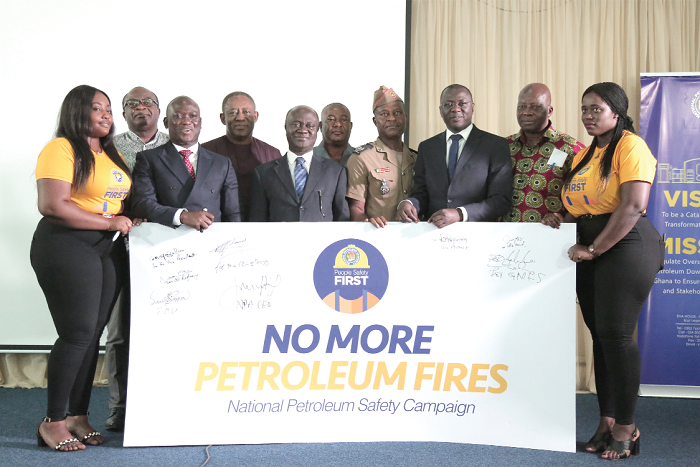
Petroleum Authority begins safety campaign
The National Petroleum Authority (NPA) has launched a petroleum safety campaign to help curb petroleum-related accidents in the country.
The campaign comes almost a month after the gory Atomic Junction Liquefied Petroleum Gas (LPG) explosion that killed seven people and injured more than 130 others.
The national campaign is intended to raise awareness of the adherence to safety measures in the petroleum downstream industry.
It is also to educate the public on their role in preventing fires at all petroleum installations in the country.
As part of the campaign, dubbed the National Petroleum Safety Campaign, the authority is expected to educate operators of restaurants, hotels and ‘chop-bars’ in all regions of the country.
Awareness
The Chief Executive Officer of the NPA, Mr Hassan Tampuli, speaking at the launch of the campaign, said the safety campaign was aimed at raising awareness of the need to follow safety rules when handling petroleum products.
“The NPA as a regulator of the petroleum downstream industry expects that the public understands the risks and dangers of not using petroleum products safely and discouraging any unconventional use of the products without seeking expert advice. Note that safety is a shared responsibility,” he said.
According to the Plastic Surgery and Burns Centre of the Korle Bu Teaching Hospital, about 40 per cent of patients who reported to the centre had suffered petroleum product-related accidents.
The NPA boss said the trend was worrying and that there were working intensely to raise awareness using the media on safe ways of using petroleum products to curb injuries and deaths from petroleum installations.
Efforts
Going into what the authority was doing to ensure the integrity of the various LPG stations, Mr Tampuli said the authority had constituted a committee to oversee a comprehensive risk assessment of existing LPG infrastructure in the country.
In collaboration with other agencies, including the Ghana National Fire Service, Environmental Protection Agency and Factories Inspectorate Department, the NPA has so far inspected 276 LPG refilling stations across the country, the NPA CEO said.
He said high-risk stations would be closed down, while low-risk stations would be designated for the supply of gas for vehicles with improved standards.
He said 45 of the stations had been closed down due to non-compliance, with 37 others also marked for closure when their stock levels reduce to levels within the safety zone.
“Twenty-six outlets have been reopened after comprehensive inspections were carried out by the Inspections and Monitoring Unit of the authority. One hundred and fourteen outlets were found to be in full compliance with the prescribed safety standards. Out of the 636 registered refilling plants, 54 are not in operation,” he stated.
Safety conscious
The Vice-President, Dr Mahamudu Bawumia, in a speech read on his behalf, said the government was concerned about the incidents of petroleum-related fires and other safety issues arising out of the handling of petroleum products.
“We need to understand what we are doing wrong when handling these products to enable us to curb the incidents of petroleum-related accidents. Key questions we must ask ourselves as consumers using LPG, petrol, premix and other products are whether we are too much in a hurry when handling these products that we completely fail to take any safety precautions or we are becoming comfortable in the use of these petroleum products that we misapply the safety rules,” he asked rhetorically.
